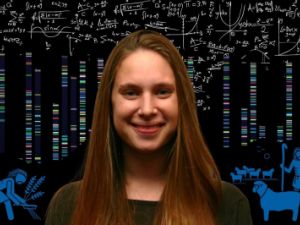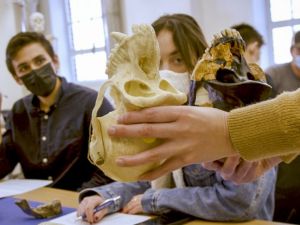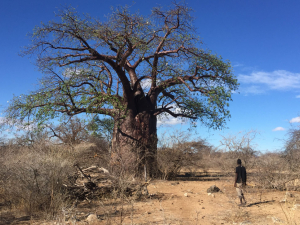Doug Boyer was a hit at his daughter’s kindergarten show and tell. The associate professor of Evolutionary Anthropology came armed with a life-sized, 3D-printed vertebra belonging to the world’s largest living snake, the green anaconda (Eunectes murinus). Once the students were done oohing and aahing over the plum-sized bone replica, he pulled a second vertebra, ten times larger than the anaconda’s, out of his bag. It was a life-sized replica of a vertebra belonging to Titanoboa, a snake that went… read more about How a Digital Repository Is Democratizing Science From a Duke Basement »
Amy Goldberg’s passion for human evolution probably started with the genetic anthropology books her father poured over during his Ph.D. studies. “I remember very clearly sitting and looking at one of his big textbooks and sounding out the word au-stra-lo-pith-e-cus when I was maybe nine or 10 years old,” she recalled. Goldberg is an assistant professor of Evolutionary Anthropology, Mathematics and Biology, which indicates how interdisciplinary her background is. While shared appointments between Biology and Evolutionary… read more about With Amy Goldberg, Mathematics Meets Genetics to Decode Our Evolutionary Past »
September is National Service Dog Month, and the four new members of the 2022 Duke Puppy Kindergarten have been around the Triangle promoting the value of service dogs. The puppies are part of a National Institute of Health-funded project that tests the cognitive development of puppies from eight weeks old to 20 weeks old, during their last, rapid stage of puppy brain development. The goal of the project is to understand what experiences puppies need early in life to be successful service animals. This… read more about Waiting to Serve: Duke Puppy Kindergarten Students Promote the Value of Service Dogs »
Experts know COVID-19 won’t be the last major pandemic. What they don’t know is where, or when, the next one will begin. An interdisciplinary team from Duke, the University of North Carolina at Chapel Hill (UNC), North Carolina State University (NCSU) and the Triangle Center for Evolutionary Medicine (TriCEM) is hoping to change that. Thanks to a $1 million grant from the National Science Foundation, the team is pinpointing the factors that are likely to turn a local outbreak into a global pandemic. At Duke, the research… read more about Duke Team Awarded $1 million to Predict the Next Pandemic »
DURHAM, N.C. -- New genetic analyses of wild baboons in southern Kenya reveals that most of them carry traces of hybridization in their DNA. As a result of interbreeding, about a third of their genetic makeup consists of genes from another, closely-related species. The study took place in a region near Kenya’s Amboseli National Park, where yellow baboons occasionally meet and intermix with their anubis baboon neighbors that live to the northwest. Researchers have monitored these animals on a near-daily basis since 1971,… read more about These Baboons Borrowed a Third of Their Genes From Their Cousins »
The National Academy of Sciences announced today the election of 120 members and 30 international members in recognition of their distinguished and continuing achievements in original research. Established by an Act of Congress, signed by President Abraham Lincoln in 1863, the NAS is charged with providing independent, objective advice to the nation on matters related to science and technology. Duke’s three new members join 28 other members of the National Academy of Sciences on the Duke faculty. They are… read more about Two Trinity Faculty Elected to National Academy of Sciences »
Like all Duke students, Keaton, Laney, Odom and Nestle grew a lot during their time on campus. Except they were here for just 12 weeks. The spring 2022 class at the Duke Puppy Kindergarten has graduated and headed off on the next phase of their journey to become assistance dogs. The Duke Puppy Kindergarten is a longitudinal study funded by the National Institute of Health to assess how different rearing strategies affect the behavior and cognitive development of assistance dogs. Each semester, more… read more about Spring 2022 Class Graduates Duke Puppy Kindergarten »
Elyana Riddick, a political science major, registered for an intro to evolutionary anthropology class only because she needed a natural science course to fulfill her requirements. Instead, the class shifted her view of the world. “What’s been most interesting about this course is getting to understand and really know how much it took for us to get here,” said Riddick, a sophomore. “Even simple things as walking and talking have taken millions and millions of years… read more about An Evolutionary Anthropology Class Can Shift a Whole World View »
DURHAM, N.C. -- Finding love in a small isolated place can be tough when everyone is a familiar face, or when half the dating pool is already out because they’re all close relatives. That’s no less true for the wild baboons of Amboseli, who live in close-knit groups of 20 to 150 at the foot of Mount Kilimanjaro in Kenya. A new Duke University-led study takes an in-depth look at the various ways these monkeys keep their family and romantic lives from getting too intertwined. Drawing on 48 years of data on the family trees… read more about How Baboons Keep Healthy Family Boundaries »






























